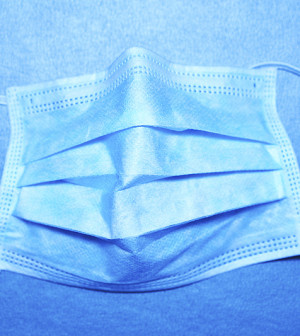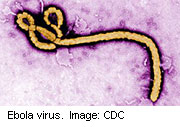- Could Artificial Sweeteners Be Aging the Brain Faster?
- Techniques for Soothing Your Nervous System
- Does the Water in Your House Smell Funny? Here’s Why
- Can a Daily Dose of Apple Cider Vinegar Actually Aid Weight Loss?
- 6 Health Beverages That Can Actually Spike Your Blood Sugar
- Treatment Options for Social Anxiety Disorder
- Understanding the Connection Between Anxiety and Depression
- How Daily Prunes Can Influence Cholesterol and Inflammation
- When to Take B12 for Better Absorption and Energy
- Epsom Salts: Health Benefits and Uses
Effective Ebola Vaccine May Be Here: Health Officials


An experimental Ebola vaccine appears highly effective against the deadly infectious disease, according to an interim analysis of findings from a clinical trial being conducted in the West African nation of Guinea.
So far, the vaccine has been 100 percent effective in individuals, the United Nation’s World Health Organization (WHO) said in a news release on Friday.
An independent body of international experts conducted the review and recommended that the trial of the VSV-EBOV vaccine continue. The findings were published July 31 in The Lancet.
“This is an extremely promising development,” Dr. Margaret Chan, WHO director-general, said in an agency news release. “The credit goes to the Guinean government, the people living in the communities and our partners in this project. An effective vaccine will be another very important tool for both current and future Ebola outbreaks.”
More research is needed to determine if the vaccine can protect large groups of people through what is called “herd immunity,” health officials added. To that end, Guinean officials have approved continuation of the clinical trial, WHO said.
“The ‘ring’ vaccination method adopted for the vaccine trial is based on the smallpox eradication strategy,” John-Arne Rottingen, director of the division of infectious disease control at the Norwegian Institute of Public Health and chair of the study’s Steering Group, explained in the news release.
“The premise is that by vaccinating all people who have come into contact with an infected person you create a protective ‘ring’ and stop the virus from spreading further. This strategy has helped us to follow the dispersed epidemic in Guinea, and will provide a way to continue this as a public health intervention in trial mode,” he explained.
The clinical trial first began in Ebola-affected communities on March 23, 2015, WHO said. So far, more than 4,000 adults who had close contact with about 100 Ebola patients — including relatives, neighbors and co-workers — have voluntarily taken part in the trial.
On the basis of evidence of the vaccine’s safety, the trial will now include teens aged 13 to 17 and possibly children aged 6 to 12.
“In parallel with the ring vaccination we are also conducting a trial of the same vaccine on frontline workers,” Bertrand Draguez, medical director at Doctors Without Borders, said in the news release.
“These people have worked tirelessly and put their lives at risk every day to take care of sick people. If the vaccine is effective, then we are already protecting them from the virus. With such high efficacy, all affected countries should immediately start and multiply ring vaccinations to break chains of transmission and vaccinate all frontline workers to protect them,” Draguez said.
The VSV-EBOV vaccine was developed by the Public Health Agency of Canada and licensed to Merck & Co. Inc. and NewLink Genetics Corp.
More information
The U.S. Centers for Disease Control and Prevention has more about Ebola.
Source: HealthDay
Copyright © 2026 HealthDay. All rights reserved.










